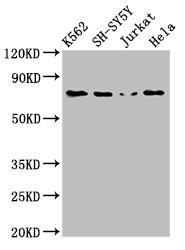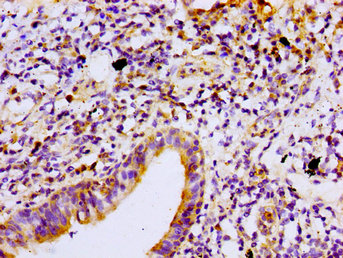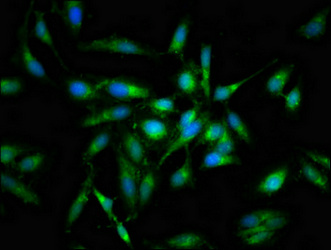PRKCB Antibody
-
货号:CSB-PA15849A0Rb
-
规格:¥440
-
促销:
-
图片:
-
Western Blot
Positive WB detected in: K562 whole cell lysate, SH-SY5Y whole cell lysate, Jurkat whole cell lysate, Hela whole cell lysate
All lanes: PRKCB antibody at 3μg/ml
Secondary
Goat polyclonal to rabbit IgG at 1/50000 dilution
Predicted band size: 77, 78 kDa
Observed band size: 77 kDa -
Immunohistochemistry of paraffin-embedded human lung cancer using CSB-PA15849A0Rb at dilution of 1:100
-
Immunofluorescent analysis of Hela cells using CSB-PA15849A0Rb at dilution of 1:100 and Alexa Fluor 488-congugated AffiniPure Goat Anti-Rabbit IgG(H+L)
-
-
其他:
产品详情
-
产品名称:Rabbit anti-Homo sapiens (Human) PRKCB Polyclonal antibody
-
Uniprot No.:P05771
-
基因名:
-
别名:KPCB_HUMAN antibody; PKC Beta antibody; PKC-B antibody; PKC-beta antibody; PKCB antibody; Prkcb antibody; PRKCB II antibody; PRKCB2 antibody; Protein kinase C beta antibody; Protein kinase C beta type antibody
-
宿主:Rabbit
-
反应种属:Human, Rat
-
免疫原:Recombinant Human Protein kinase C beta type protein (517-643AA)
-
免疫原种属:Homo sapiens (Human)
-
标记方式:Non-conjugated
本页面中的产品,PRKCB Antibody (CSB-PA15849A0Rb),的标记方式是Non-conjugated。对于PRKCB Antibody,我们还提供其他标记。见下表:
-
克隆类型:Polyclonal
-
抗体亚型:IgG
-
纯化方式:>95%, Protein G purified
-
浓度:It differs from different batches. Please contact us to confirm it.
-
保存缓冲液:Preservative: 0.03% Proclin 300
Constituents: 50% Glycerol, 0.01M PBS, pH 7.4 -
产品提供形式:Liquid
-
应用范围:ELISA, WB, IHC, IF
-
推荐稀释比:
Application Recommended Dilution WB 1:500-1:5000 IHC 1:20-1:200 IF 1:50-1:200 -
Protocols:
-
储存条件:Upon receipt, store at -20°C or -80°C. Avoid repeated freeze.
-
货期:Basically, we can dispatch the products out in 1-3 working days after receiving your orders. Delivery time maybe differs from different purchasing way or location, please kindly consult your local distributors for specific delivery time.
相关产品
靶点详情
-
功能:Calcium-activated, phospholipid- and diacylglycerol (DAG)-dependent serine/threonine-protein kinase involved in various cellular processes such as regulation of the B-cell receptor (BCR) signalosome, oxidative stress-induced apoptosis, androgen receptor-dependent transcription regulation, insulin signaling and endothelial cells proliferation. Plays a key role in B-cell activation by regulating BCR-induced NF-kappa-B activation. Mediates the activation of the canonical NF-kappa-B pathway (NFKB1) by direct phosphorylation of CARD11/CARMA1 at 'Ser-559', 'Ser-644' and 'Ser-652'. Phosphorylation induces CARD11/CARMA1 association with lipid rafts and recruitment of the BCL10-MALT1 complex as well as MAP3K7/TAK1, which then activates IKK complex, resulting in nuclear translocation and activation of NFKB1. Plays a direct role in the negative feedback regulation of the BCR signaling, by down-modulating BTK function via direct phosphorylation of BTK at 'Ser-180', which results in the alteration of BTK plasma membrane localization and in turn inhibition of BTK activity. Involved in apoptosis following oxidative damage: in case of oxidative conditions, specifically phosphorylates 'Ser-36' of isoform p66Shc of SHC1, leading to mitochondrial accumulation of p66Shc, where p66Shc acts as a reactive oxygen species producer. Acts as a coactivator of androgen receptor (AR)-dependent transcription, by being recruited to AR target genes and specifically mediating phosphorylation of 'Thr-6' of histone H3 (H3T6ph), a specific tag for epigenetic transcriptional activation that prevents demethylation of histone H3 'Lys-4' (H3K4me) by LSD1/KDM1A. In insulin signaling, may function downstream of IRS1 in muscle cells and mediate insulin-dependent DNA synthesis through the RAF1-MAPK/ERK signaling cascade. Participates in the regulation of glucose transport in adipocytes by negatively modulating the insulin-stimulated translocation of the glucose transporter SLC2A4/GLUT4. Phosphorylates SLC2A1/GLUT1, promoting glucose uptake by SLC2A1/GLUT1. Under high glucose in pancreatic beta-cells, is probably involved in the inhibition of the insulin gene transcription, via regulation of MYC expression. In endothelial cells, activation of PRKCB induces increased phosphorylation of RB1, increased VEGFA-induced cell proliferation, and inhibits PI3K/AKT-dependent nitric oxide synthase (NOS3/eNOS) regulation by insulin, which causes endothelial dysfunction. Also involved in triglyceride homeostasis. Phosphorylates ATF2 which promotes cooperation between ATF2 and JUN, activating transcription.
-
基因功能参考文献:
- Tumor suppressor activity of protein kinase C-beta.[review] PMID: 28571764
- The results demonstrate a direct relationship between SP1 binding and protein kinase CbetaII (PKCbetaII) transcription, and further suggest that this transcription factor is a contributor to the pathobiology of chronic lymphocytic leukaemia and potentially other malignant cells where PKCbetaII is overexpressed. PMID: 28233872
- An exaggerated vasoconstriction response to dexmedetomidine, an alpha-2 adrenergic agonist, has been associated with SNP rs9922316 in the gene for protein kinase C type beta ( PRKCB). PMID: 28482761
- PKC beta would sensitize cervical cancer cells to chemotherapy via reducing the chemotherapy induced autophagy in cancer cells. PMID: 28246354
- Loss of PRKCB2 expression is associated with colorectal cancer. PMID: 26989024
- significantly different gene expressions of BECN1 and PRKCB between the control and the Alzheimer's disease (AD) groups and of CDKN2A between the control and the preclinical AD groups, are reported. PMID: 26510741
- a primary functional variant of PRKCB (rs35015313) was identified by genotype imputation using a phased panel of 1,070 Japanese individuals from a prospective, general population cohort study and subsequent in vitro functional analyses. These results may lead to improved understanding of the disease pathways involved in primary biliary cholangitis. PMID: 28062665
- our findings identify PRKCB gene as a novel candidate gene for familial Meniere's Disease (MD )and its expression gradient in supporting cells of the organ of Corti deserves attention, given the role of supporting cells in K(+ )recycling within the endolymph, and its apical turn location may explain the onset of hearing loss at low frequencies in MD PMID: 27329761
- Activation of the Pro-Oxidant PKCbetaII-p66Shc Signaling Pathway Contributes to Pericyte Dysfunction in Skeletal Muscles of Patients With Diabetes With Critical Limb Ischemia PMID: 27600065
- Taken together, these data argue for a complex mechanism of PKC-beta-dependent regulation of SHCA (p66) activation involving Ser(139) and a motif surrounding Ser(213). PMID: 27624939
- The study aimed to identify a small set of genetic signatures that may reliably predict the individuals with a high genetic propensity to heroin addiction. A set of 4 genes (JUN, CEBPB, PRKCB, ENO2, or CEBPG) could predict the diagnosis of heroin addiction with the accuracy rate around 85% in our dataset. PMID: 27495086
- Bone marrow stroma-induced resistance of chronic lymphocytic leukemia cells to arsenic trioxide involves Mcl-1 upregulation and is overcome by inhibiting the PI3Kdelta or PKCbeta signaling pathways. PMID: 26540567
- PPAR-delta and NKIRAS1 are downstream mediators in the PRKCB pathway in human umbilical vein endothelial cells. PMID: 26459836
- Lower hydrogen sulfide is associated with cardiovascular mortality, which involves PKCBII/Akt pathway in chronic hemodialysis patients. PMID: 26439941
- Study found a significant decrease of PRCKB1 mRNA expression in subsyndromal symptomatic depression, suggesting PRKCB1 might be a candidate gene and biomarker PMID: 26343587
- PKCbetaII inhibits the ubiquitination of beta-arrestin2 in an autophosphorylation-dependent manner PMID: 26545496
- Ionizing radiation-induced eNOS activation in human vascular endothelial cells is attributed to both the up-regulation of PKC-betaII and the increase in ROS generation which were independent of each other. PMID: 25869503
- Effect of PKC-beta Signaling Pathway on Expression of MCP-1 and VCAM-1 in Different Cell Models in Response to Advanced Glycation End Products PMID: 26008233
- Direct interaction between the two proteins leads to Apoptin-induced activation of PKC and consequently activated PKCbetaI mediates phosphorylation of Apoptin to promote its tumour-specific nuclear translocation and cytotoxic function. PMID: 25828882
- Gene fusions involving PRKC genes occur in several morphological and clinical subsets of benign fibrous histiocytoma, but they seem to account for only a minority of the cases. PMID: 26121314
- PMA primed PBTLs for polarization under flow, with protein kinase C (PKC)-delta enriched in the leading edge, PKC-betaI in the microtubule organizing center, and PKC-betaII in the uropod and peripheral region. PMID: 25548371
- Our data indicate a new direction for LOX-1 regulation by the modulation of the PKCbeta/NAPDH oxidase/SIRT1/HSF1 mechanism PMID: 25982096
- Hyperoxia can increase the expression of PKCbeta in alveolar epithelial cells and production of mitochondrial reactive oxygen species and decrease mitochondrial membrane potential. PMID: 25815500
- human AKAP79-anchored PKC selectively phosphorylates the Robo3.1 receptor subtype on serine 1330 PMID: 25882844
- that the high-concentration glucose-induced disruption of endothelial adherens junctions is mediated by tyrosine phosphorylation of vascular endothelial cadherin through PKC-beta and myosin light chain phosphorylation PMID: 25927959
- PKCbeta2 inhibition protects mice from gut ischemia-reperfusion injury by suppressing the adaptor p66(Shc)-mediated oxidative stress and subsequent apoptosis. PMID: 24722289
- The detected PDPN-PRKCB, CD63-PRKCD and LAMTOR1-PRKCD gene fusions are all predicted to result in chimeric proteins consisting of the membrane-binding part of PDPN, CD63 or LAMTOR1 PMID: 24721208
- PRKCB2 is specifically required for mTORC2-dependent AC9 activation and back retraction during neutrophil chemotaxis. PMID: 24600048
- Pharmacological inhibition PRKCB1 via their specific inhibitors and neutralisation of O2 (*-) by a cell-permeable superoxide dismutase mimetic. PMID: 24936444
- isoform betaII plays a central role in the PKC-dependent regulation of Kv1.5/Kvbeta1.2 channels. PMID: 24682423
- shRNA knockdown of PKCbeta reduced cellular proliferation, colony formation, and migratory capacity of melanoma cells and also reduced lung colonization of stably transduced melanoma cells in mice. PMID: 24406113
- STAT3 bound to previously undescribed negative regulatory elements within the promoter of PRKCB, which encodes PKCbetaII. PMID: 24550541
- Protein kinase C beta is important for the regulation of NHE-1 activity, which is associated with ERK1/2-p90RSK signaling pathways as a kinase of NHE-1 in cortical neuronal cells exposed to glutamate. PMID: 24378530
- Vimentin is a phosphorylation target of PKC-beta in MCP-1-treated monocytes and that PKC-beta phosphorylation is essential for vimentin secretion. PMID: 23974215
- CD40L may contribute to atherogenesis via PRKCB by activating endothelial cells and recruiting monocytes to them. PMID: 24039784
- established an important role for PKCbeta1 in PANC1 cells suggesting it would act as a suppressor of tumorigenic behavior in pancreatic cancer PMID: 23695799
- Data suggest that hyperglycemia promotes cerebral-barrier dysfunction through activation of PKCbeta and consequent stimulation of oxidative stress and tight junction dissolution. PMID: 23617822
- This review summarizes the current knowledge of both PKCbeta and PKCdelta isoforms during atherogenesis, and addresses differential roles and disputable observations of PKC isoforms. PMID: 24440741
- The translocation of PKCBetaII was induced by soluble amyloid Beta precursor protein alpha. PMID: 23905995
- Normalization of glucose levels and silencing PKCB activity neutralized the effects of hyperglycemia on occludin and RhoA/Rho-kinase/MLC2 expression, localization, and activity and consequently improved in vitro blood-brain barrier integrity and function. PMID: 23963366
- HIF1alpha and PKCbeta have roles in mediating the effect of oxygen and glucose during wound healing PMID: 23562913
- PKCbeta is the isoform responsible for Syk negative regulation PMID: 23960082
- PKCalpha and PKCbeta cooperate in IL-2 transcriptional transactivation in primary mouse T cells independently of the actions of PKCtheta;. PMID: 23439007
- Protein kinase Cbeta critically regulates dopamine D2 autoreceptor-activated dopamine transporter trafficking. PMID: 23458603
- Genetic variation in protein kinase C type beta may contribute toward the interindividual variation in DHV constriction responses to alpha2-AR activation by the agonist dexmedetomidine PMID: 23337848
- PKCbeta plays an important role in Acquired immunodeficiency syndrome (AIDS)-related non-Hodgkin lymphoma survival. PMID: 21997316
- Inhibition of PKCbeta enhanced apoptosis of human autoreactive B cells. PMID: 23280626
- The expression of protein kinase C (PKC)-betaII and the subsequent activation of NF-kappaB in bone marrow stromal cells are prerequisites to support the survival of malignant B cells. PMID: 23328482
- Comp of gene expression between PROX1-overexpressing and mock-transfected cells revealed that the expression of PRKCB2 is down-regulated in PROX1-overexpressing cells. A PRKCB inhibitor suppressed growth of control cells more than PROX1-expressing cells. PMID: 22833470
- Estrogen receptor-alpha, RBCK1, and protein kinase C beta 1 cooperate to regulate estrogen receptor-alpha gene expression. PMID: 23042805
显示更多
收起更多
-
亚细胞定位:Cytoplasm. Nucleus. Membrane; Peripheral membrane protein.
-
蛋白家族:Protein kinase superfamily, AGC Ser/Thr protein kinase family, PKC subfamily
-
数据库链接:
HGNC: 9395
OMIM: 176970
KEGG: hsa:5579
STRING: 9606.ENSP00000305355
UniGene: Hs.460355
Most popular with customers
-
-
YWHAB Recombinant Monoclonal Antibody
Applications: ELISA, WB, IF, FC
Species Reactivity: Human, Mouse, Rat
-
Phospho-YAP1 (S127) Recombinant Monoclonal Antibody
Applications: ELISA, WB, IHC
Species Reactivity: Human
-
-
-
-
-
























